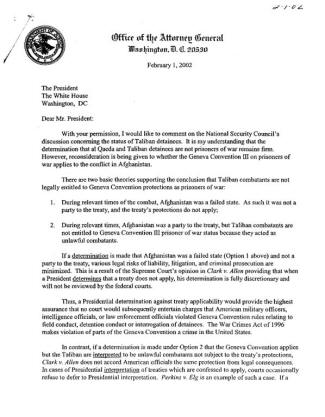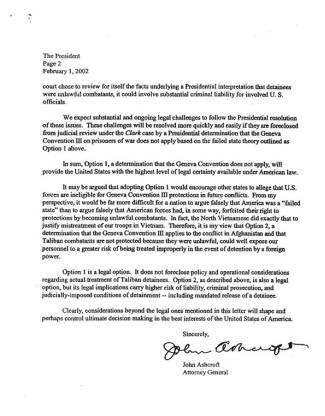|
Site Map THE TORTURE PAPERS: THE ROAD TO ABU GHRAIB |
|
MEMO 9 Office of the
Attorney General February 1, 2002 The President Dear Mr. President: With your permission, I would like to comment on the National Security Council's discussion concerning the status of Taliban detainees. It is my understanding that the determination that al Qaeda and Taliban detainees are not prisoners of war remains firm. However, reconsideration is being given to whether the Geneva Convention III on prisoners of war applies to the conflict in Afghanistan. There are two basic theories supporting the conclusion that Taliban combatants are not legally entitled to Geneva Convention protections as prisoners of war: 1. During relevant times of the combat, Afghanistan was a failed state. As such it was not a party to the treaty, and the treaty's protections do not apply; 2. During relevant times, Afghanistan was a party to the treaty, but Taliban combatants are not entitled to Geneva Convention III prisoner of war status because they acted as unlawful combatants. If a determination is made that Afghanistan was a failed state (Option 1 above) and not a party to the treaty, various legal risks of liability, litigation, and criminal prosecution are minimized. This is a result of the Supreme Court's opinion in Clark v. Allen providing that when a President determines that a treaty does not apply, his determination is fully discretionary and will not be reviewed by the federal courts. Thus, a Presidential determination against treaty applicability would provide the highest assurance that no court would subsequently entertain charges that American military officers, intelligence officials, or law enforcement officials violated Geneva Convention rules relating to field conduct, detention conduct or interrogation of detainees. The War Crimes Act of 1996 makes violation of parts of the Geneva Convention a crime in the United States. In contrast, if a determination is made under Option 2 that the Geneva Convention applies but the Taliban are interpreted to be unlawful combatants not subject to the treaty's protections, Clark v. Allen does not accord American officials the same protection from legal consequences. In cases of Presidential interpretation of treaties which are confessed to apply, courts occasionally refuse to defer to Presidential interpretation. Perkins v. Elg is an example of such a case. If a court chose to review for itself the facts underlying a Presidential interpretation that detainees were unlawful combatants, it could involve substantial criminal liability for involved U.S. officials. We expect substantial and ongoing legal challenges to follow the Presidential resolution of these issues. These challenges will be resolved more quickly and easily if they are foreclosed from judicial review under the Clark case by a Presidential determination that the Geneva Convention III on prisoners of war does not apply based on the failed state theory outlined as Option 1 above. In sum, Option 1, a determination that the Geneva Convention does not apply, will provide the United States with the highest level of legal certainty available under American law. It may be argued that adopting Option 1 would encourage other states to allege that U.S. forces are ineligible for Geneva Convention III protections in future conflicts. From my perspective, it would be far more difficult for a nation to argue falsely that America was a "failed state" than to argue falsely that American forces had, in some way, forfeited their right to protections by becoming unlawful combatants. In fact, the North Vietnamese did exactly that to justify mistreatment of our troops in Vietnam. Therefore, it is my view that Option 2, a determination that the Geneva Convention III applies to the conflict in Afghanistan and that Taliban combatants are not protected because they were unlawful, could well expose our personnel to a greater risk of being treated improperly in the event of detention by a foreign power. Option 1 is a legal option. It does not foreclose policy and operational considerations regarding actual treatment of Taliban detainees. Option 2, as described above, is also a legal option, but its legal implications carry higher risk of liability, criminal prosecution, and judicially-imposed conditions of detainment -- including mandated release of a detainee. Clearly, considerations beyond the legal ones mentioned in this letter will shape and perhaps control ultimate decision making in the best interests of the United States of America. Sincerely, John Ashcroft |

